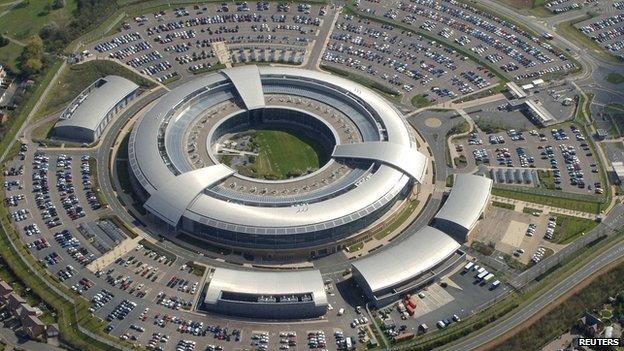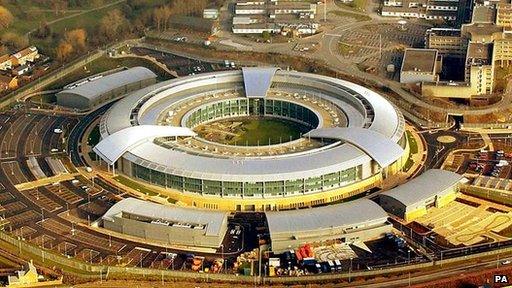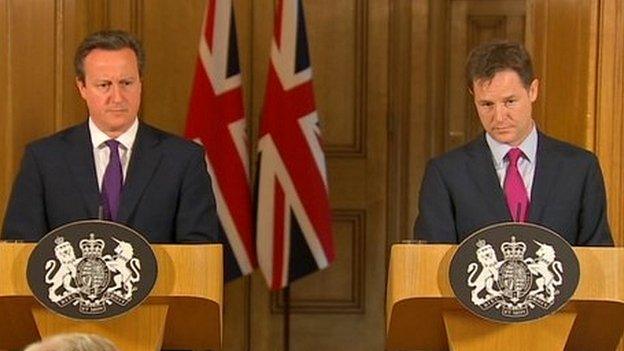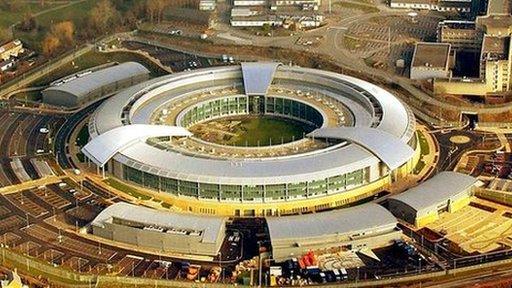Tribunal hearing legal challenge over GCHQ surveillance claims
- Published

The tribunal will determine whether allegations of snooping by GCHQ are legal
A tribunal is hearing a legal challenge by civil liberty groups against the alleged use of mass surveillance programmes by UK intelligence services.
Privacy International and Liberty are among those challenging the legality of alleged "interception, collection and use of communications" by agencies.
It follows revelations by the former US intelligence analyst Edward Snowden about UK and US surveillance practices.
The UK government says interception is subject to strict controls.
The case - also brought by Amnesty International and the American Civil Liberties Union and other groups - centres on the alleged use by UK intelligence and security agencies of a mass surveillance operation called Tempora.
The UK government has neither confirmed nor denied the existence of the operation.
But documents leaked by whistleblower Mr Snowden and published in the Guardian newspaper, external claimed the existence of Tempora, which the paper said allowed access to the recordings of phone calls, the content of email messages and entries on Facebook.

Analysis
By BBC's Gordon Corera

This is one of a number of challenges brought by privacy and civil liberties groups in the wake of the Edward Snowden allegations. At issue is the lawfulness of aspects of the work of GCHQ.
GCHQ has always maintained its work is lawful but critics have raised questions about how the legal framework applies to specific areas such as intelligence sharing with the US and the division between domestic and international communications.
The tribunal - made up of judges - is the only place where people can go with complaints about the work of intelligence agencies - but this will be an unusually high profile hearing.
The law surrounding interception and intelligence gathering is highly complex and used to be understood by only a few.
However, following the Snowden revelations and last week's announcement about emergency legislation on data retention, the attention being paid to what can and cannot be done is growing.

'Hypothetical facts'
The Investigatory Powers Tribunal (IPT) - which monitors whether the UK's spying laws are being observed - is seeking to determine whether the Tempora programme exists and, if so, whether it violates articles 8 and 10 of the European Convention on Human Rights.
It is also examining the UK's use of the US Prism mass data mining programme at a hearing in the Rolls Building in central London.
The BBC's legal affairs correspondent Clive Coleman said the "unprecedented legal challenge" - which will be held in public - was likely to be a "highly unusual hearing".
He said the case would be held on the basis of "agreed hypothetical facts".
A spokeswoman for Liberty, which campaigns for civil liberties, said it was making the challenge after concluding it was "highly likely" it had been monitored.
Its legal director James Welch said: "As legislation is introduced to paper over one crack in the crumbling surveillance state, another faces challenge.
"Not content with forcing service providers to keep details of our calls and browsing histories, the government is fighting to retain the right to trawl through our communications with anyone outside and many inside the country.
"When will it learn that it is neither ethical nor efficient to turn everyone into suspects?"

Investigatory Powers Tribunal
Set up in October 2000
Can investigate claims against MI5, MI6 or GCHQ
Eight men and two women make up the tribunal, which comprises senior barristers
Members serve terms of five years after which they reapply or stand down
Current president Mr Justice Burton has been on the tribunal since its inception

Lawyers acting for the security services will appear before the IPT to argue that, if indiscriminate mass surveillance had taken place, it was lawful and did not breach the right to privacy or freedom of expression.
The tribunal comes days after the government announced it would introduce emergency powers to ensure police and security services can continue to access phone and internet records.
Prime Minister David Cameron said urgent action had been needed to protect the public from "criminals and terrorists" after the European Court of Justice struck down existing powers.
In May, Google launched a service giving Europeans the "right to be forgotten" following a landmark European Union court ruling which said "irrelevant" and outdated data should be forgotten.
- Published13 May 2014

- Published10 July 2014

- Published2 July 2014
